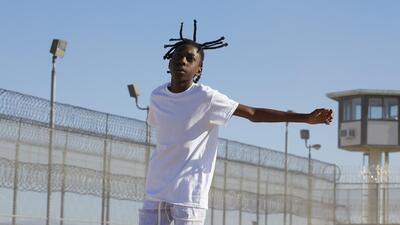But for all the fest’s foibles, I think it would be shortsighted to pass that ire down to the filmmakers or their projects–many of whom had little to no say in these decisions and who may not even support the actions the festival endorses (or knew about it before their role at the fest was secured). Most of the films I caught at the fest were, if not great, at the very least good, with a few remarkable gems thrown in between–tales of resilience and outsiderdom that deserve a closer look.
First is Contessa Gayles’ “Songs from the Hole,” a staggering hip-hop visual album that also doubles as a cry for humanity and justice for its central subject. At the age of fifteen, James “JJ’88” Jacobs shot and killed a man on the streets of LA for a perceived gangland slight, landing him in prison with a double-life sentence. Much of that time was spent in “the hole,” aka solitary confinement—a place where you’re left alone in a tiny box with literally nothing but your thoughts.
Lucky for Jacobs, he also had a notebook and pen, and has used the proceeding 15 years of his sentence (Jacobs was 31 at the time of filming) to explore his past, present, and uncertain future through music, scrawling lyrics amidst the long wait for a resentencing that may never come. But thanks to Jacobs, Gayles, and a bevy of talented music producers, these songs come to life outside the walls of his prison with bracing authenticity.
These are no amateur tracks: they’re slickly produced, brimming with aching, pained lyrics (“If the legal system don’t give me life, I’ll probably get shot by my own nine”), feeling easily like contemporaries to the work of J. Cole or Kendrick Lamar. Gayles handles the visual album sequences with remarkable visual panache, literalizing Jacobs’ honesty about the anger that led to that moment and the remorse he feels about the life and youth he has sacrificed.
At the same time, these sequences, and the film itself, make clear the circumstances that led him down the path in the first place: Poverty, systemic discrimination, the predatory fears of white supremacy (a frequent image involves an actor playing young Jacobs bedecked in a hoodie fitted with antlers: Trayvon Martin as prey for a hunter). On top of that, Jacobs grapples with the knowledge that his brother was killed a mere three days after his hit, and the prospect of forgiving the man responsible.

